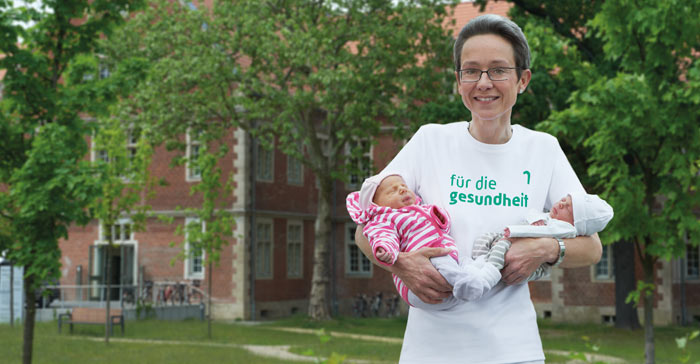Dr. Annette Isbruch is a specialist in Berlin-Buch for high-risk pregnancies

For Dr. Annette Isbruch, head obstetrician/gynecologist at HELIOS Klinikum Berlin-Buch, perinatology is a family tradition. Her mother worked in the same field as a doctor in the municipal hospital in Berlin-Buch. Since the HELIOS group took over the hospital site in 2001, a lot has changed. Today the Department of Gynecology/ Obstetrics is one of the most modern in the region and is part of HELIOS Klinikum Berlin-Buch. The new building, which opened its doors in 2007, offers high-tech medicine and a comfortable ambience for the patients. The hospital has increasingly become the hospital of choice for expectant mothers in the region.
The Department of Gynecology/ Obstetrics is a large medical center. Dr. Isbruch works in a team of 22 doctors. Together with midwives and nurses, she performs detailed diagnosis using state-of-the-art ultrasound equipment, advises and treats expectant mothers, and delivers babies. In 2011 the obstetrics team delivered 2,535 babies. The neonatal intensive care unit (NICU) for preterm and full-term newborns in HELIOS Klinikum Berlin-Buch is certified to render the highest level of care. In the NICU Dr. Isbruch treats preterm and sick newborns that need special attention and care. She can draw on a wide spectrum of medical departments at any time: anesthesia, intensive care, pediatrics and pediatric surgery are available round the clock under one roof.
A medical focus of Dr. Isbruch, who herself is the mother of two children, is the prevention and treatment of preeclampsia, high blood pressure in expectant mothers, which if undetected can be toxic for the child. Some babies must be delivered early due to this disease of the mother. For the last five years Dr. Isbruch has been working with hypertension specialists and basic researchers of the HELIOS Klinikum, the Charité and the Max Delbrück Center on Campus Buch to elucidate the cause of this disease. They are also working to develop biomarkers to enable early diagnosis. This research collaboration is important to her, because the sooner preeclampsia is diagnosed, the better the doctor can help expectant mothers and their unborn.
all stories patient care